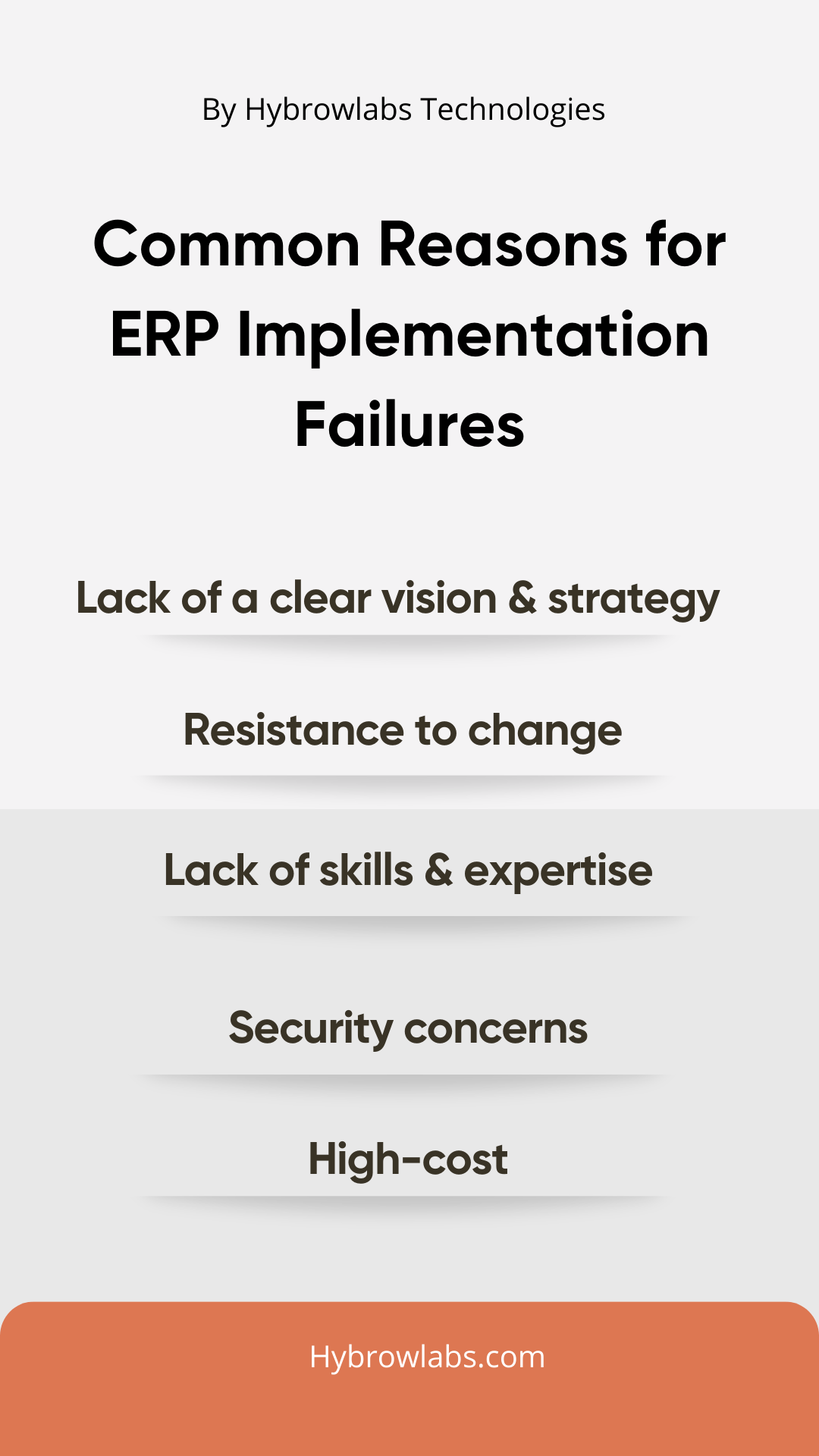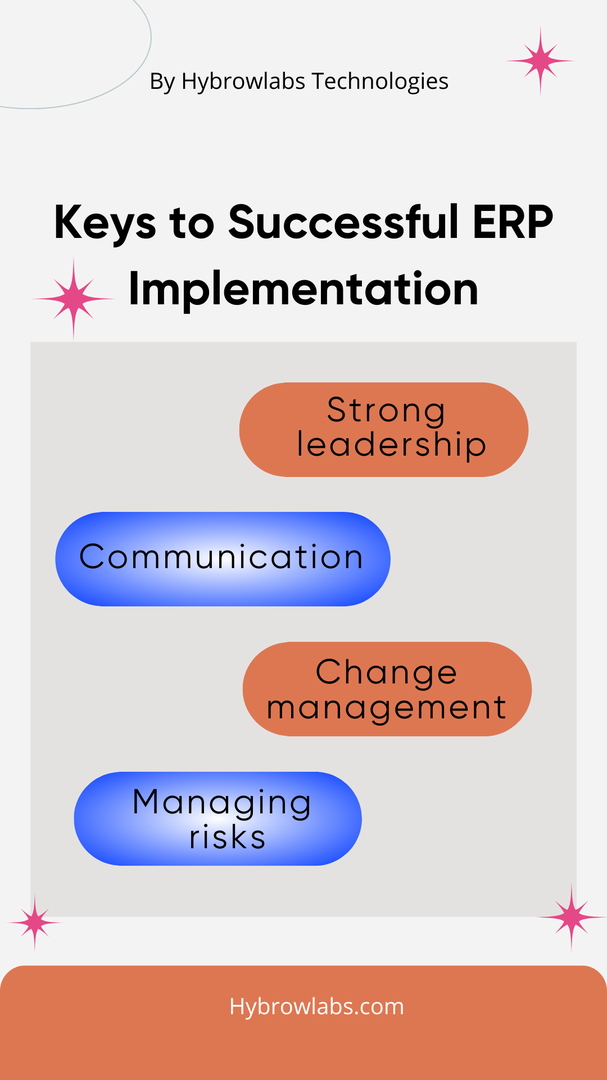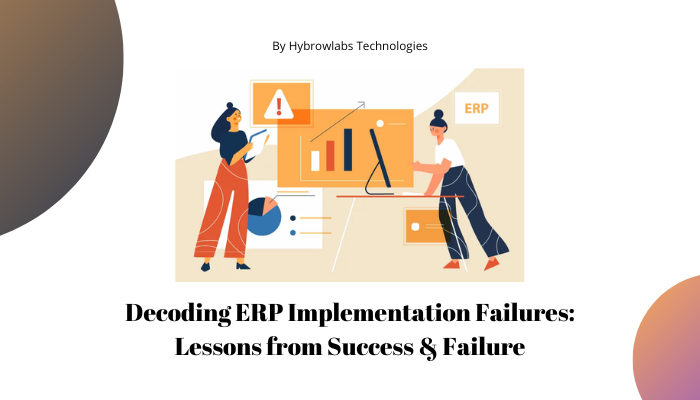The average cost of an ERP implementation is $1 million. The average implementation time is 18 months. The average return on investment for an ERP implementation is 12%.
A study by Panorama Consulting Group found that 70% of ERP implementations fail to meet their objectives. This is due to a number of factors, including a lack of clear objectives, inadequate planning, poor communication, technical issues & employee resistance to change.
Despite the challenges, ERP implementations can be successful if they are properly planned & executed. By following the tips in this blog, you can increase your chances of a successful ERP implementation. So let’s explore how!!!
What are ERP systems?
ERP stands for enterprise resource planning, which is a type of software that helps businesses maintain their core operations, such as accounting, manufacturing, sales & human resources. ERP systems integrate all of an organization's data & processes into a single system, which can help businesses enhance efficiency, visibility & decision-making.
For example, an ERP system can help a manufacturer track inventory levels, optimize production schedules & manage customer orders. It can also help a retailer track sales data, manage inventory levels & order products from suppliers.
ERP systems can be a great way for businesses to grow their operations & stay up-to-date in the competitive world. There are some challenges associated with ERP implementation. If you're considering implementing an ERP system, make sure that you have done your research & chosen a system that meets your specific needs.
Common Causes for ERP Implementation Failures and How to Avoid Them:

Are you worried about Implementation failures? No worries let’s discuss some of the most common reasons for ERP implementation failures and by understanding these risks, your business can take steps to mitigate them & increase the chances of a successful implementation.
1. Lack of clear objectives and planning:
ERP implementations are complex projects that require careful planning & execution. If the objectives of the project are not clearly defined, or if the planning is inadequate, the project is more likely to fail. For example, a company that implements an ERP system without a clear understanding of its needs is more likely to experience problems.
Lesson- It is important to have a clear understanding of the business needs & goals before implementing an ERP system. Define clear, measurable goals for your ERP implementation. Conduct thorough planning, including requirements analysis, process mapping & timeline development. Make sure that all stakeholders understand the project's purpose & expected outcomes.
2. Inadequate user training and involvement:
ERP systems are designed to be used by employees, so it is important to ensure that they are properly trained on how to use the system. If users are not adequately trained, they are more likely to make mistakes, which can lead to problems with the system.
Lesson- ERP systems are complex software applications & it is important to ensure that users are properly trained on how to use the system. If users are not adequately trained, they are more likely to make mistakes, which can lead to problems with the system. It is also important to involve users in the implementation of the process from the beginning. This will help to make sure that the system meets their needs & that they are more likely to accept it.
3. Poor communication and change management:
ERP implementations involve change & it is important to communicate effectively with employees throughout the process. If communication is poor, or if employees are not properly prepared for change, the project is more likely to fail. For example, a company implementing an ERP system without communicating effectively with its employees is more likely to experience problems.
Lesson- ERP implementations involve change & it is important to communicate effectively with employees throughout the process. If communication is poor, or if employees are not properly prepared for change, the project is more likely to fail. It is important to keep employees informed of the progress of the project, address concerns & resolve issues quickly.
4. Technical issues and customization challenges:
ERP systems are complex software applications & there can be technical issues during the implementation process. If these issues are not addressed promptly, they can lead to delays & problems with the system. For example, a company that implements an ERP system without having a contingency plan in place for technical issues is more likely to experience problems.
Lesson- ERP systems are complex software applications & there can be technical issues during the implementation process. If these issues are not addressed promptly, they can lead to delays & problems with the system. It is important to have a contingency plan in place for technical issues. Customization can also be a challenge & it is important to carefully plan the customization process to avoid problems.
5. Customization challenges:
ERP systems are designed to be used by a variety of businesses, so they may not be a perfect fit for every company. If the system needs to be customized to meet the specific needs of the company, this can add complexity to the implementation process & increase the risk of problems. For example, a company implementing an ERP system without carefully planning the customization process is more likely to experience problems.
Lesson- ERP implementations can be disruptive to employees & it is important to manage resistance to change effectively. This includes providing training & support to employees & communicating the benefits of the new system.
Now let’s take a real-world example of ERP implementation failures so that you can relate them to the problems:
1. Siemens:
In 2008, Siemens implemented an ERP system from Oracle. Problems, including technical issues, customization challenges & employee resistance to change also plagued the implementation. The project was delayed by several years & overran its budget by billions of dollars.
Siemens implemented an ERP system in the mid-2000s. The system helped Siemens to improve its manufacturing operations, which resulted in increased productivity.
Keys to Successful ERP Implementation:

Want to ensure a successful ERP implementation? Implementing an enterprise resource planning (ERP) system is a major undertaking, but it can be a game-changer for your business. ERP systems can help you improve efficiency, visibility & decision-making. But how do you ensure a successful ERP implementation? Here are the keys to success
1. Strong leadership:
A strong leader is essential for any successful project & ERP implementations are no different. The project manager must be a strong communicator & can motivate & inspire the team. They must also be able to manage the project effectively & ensure that it stays on track.
2. Communication:
Communication is key to any successful project, but it is especially important for ERP implementations. The project team must communicate regularly with all stakeholders, including employees, customers & suppliers. This will help to ensure that everyone is informed about the project & that any concerns are addressed promptly.
3. Change management:
ERP implementations involve change & it is important to manage this change effectively. This includes providing training & support to employees & communicating the benefits of the new system. It is also important to be patient & understanding, as change can be difficult for some people.
4. Setting clear objectives:
It is important to set clear objectives for the ERP implementation project. This will help to ensure that the project stays on track & that the desired results are achieved. The objectives should be SMART, which means they should be specific, measurable, achievable, relevant & time-bound.
5. Managing risks:
There are always risks associated with any project & ERP implementations are no different. It is important to identify & manage these risks early on. This can be done by creating a risk management plan & by taking steps to mitigate the risks.
Here are some real-world examples of ERP implementation failures and what can be learned from these:
1. Mission Produce:
Mission Produce is a global avocado distributor. In 2022, the company attempted to implement a new ERP system to improve its supply chain management. The project was delayed & over budget & it ultimately failed. One of the main reasons for the failure was that Mission Produce did not have a clear understanding of its requirements. The company also did not involve all stakeholders in the project & it did not have a good change management plan.
Lessons learned:
- Have a clear understanding of your requirements. Do not rush into an ERP implementation project without first understanding what you need the system to do.
- Involve all stakeholders in the project. This includes employees, customers & suppliers.
- Test the system thoroughly before it goes live. This will help to identify any potential problems & fix them before they cause issues for your users.
2. Avon:
Avon is a cosmetics company. In 2019, the company attempted to implement a new ERP system to improve its customer relationship management (CRM) capabilities. The project was delayed & over budget & it ultimately failed. One of the main reasons for the failure was that Avon did not have a good understanding of the risks involved in the project. The company also did not adequately train its employees on the new system.
Lessons learned:
- Understand the risks involved in the project. ERP implementations are complex projects & there are always risks involved. Be sure to carefully consider the risks before you start the project.
- Adequately train your employees on the new system. It is important that your employees are able to use the new system effectively. Be sure to provide them with adequate training before the system goes live.
- Be patient & persistent. ERP implementations are not easy projects. Be patient & persistent & don't give up if you encounter challenges.
3. Sony Pictures:
Sony Pictures is a film & television production company. In 2018, the company attempted to implement a new ERP system to improve its financial reporting. The project was delayed & over budget, and it ultimately failed. One of the main reasons for the failure was that Sony Pictures did not have a clear understanding of its requirements. The company also did not have a good change management plan.
Lessons learned:
- Have a good change management plan. This plan should address how you will communicate the changes to your employees and how you will help them transition to the new system.
- Be prepared to make changes as needed. Things don't always go according to plan, so be prepared to make changes as needed.
Conclusion:
Keep in mind that ERP implementation is not just a project; it's a transformation. It needs vision, commitment & a willingness to learn from both the highs & lows. If you're ready to transform your organization's functions through seamless ERP implementation, we at Hybrowlabs are here to help. With our proven track record, industry expertise & commitment to tailored solutions, we're your trusted partner on the path to success. Contact us today to discuss your ERP needs & take the first step toward a brighter future for your business.
FAQ:
1. How long does it take to implement an ERP system?
Discussion of the typical timeline for ERP implementation, which can vary depending on factors like the project's complexity and the organization's size.
2. What are the common challenges associated with ERP implementation?
Overview of the challenges organizations often face during ERP projects, such as data migration, user resistance, and customization issues.
3. How can ERP benefit my specific industry or business type?
Explanation of the industry-specific advantages and functionalities that an ERP system can offer, tailored to the reader's business sector.
4. What is the cost of ERP implementation, and how is it determined?
Insights into the factors that influence the cost of ERP implementation, including software licensing, customization, training, and ongoing maintenance.
5. Can my existing systems be integrated with an ERP system?
Discussion of the feasibility of integrating legacy systems and other software with an ERP system to ensure data continuity and process optimization.






a3dc85.jpg)

.jpg)
fd8f11.png)

.jpg)
.jpg)